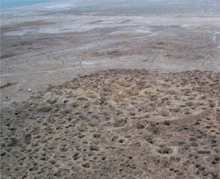German
Law Stirs Concern Illegal Artifacts Will Be Easier to Sell
Andrew Curry*
 Last
week, the German Senate ratified the 1970 UNESCO Convention
on Cultural Property, but archaeologists around the world
fear that the long-delayed approval will do more harm than
good. Many worry that Germany's interpretation of the convention
will make the country a haven for illegally excavated antiquities
from Iraq and elsewhere.
Last
week, the German Senate ratified the 1970 UNESCO Convention
on Cultural Property, but archaeologists around the world
fear that the long-delayed approval will do more harm than
good. Many worry that Germany's interpretation of the convention
will make the country a haven for illegally excavated antiquities
from Iraq and elsewhere.
The UNESCO convention has been a defining document in the
global battle to protect artistic and especially archaeological
heritage from theft, looting, and destruction. Yet governments
can make their own decisions on how to implement it. Whereas
the United States and many of the other 112 signatories
to the convention restrict or prohibit trade in broad categories
of artifacts, the German law passed last Friday requires
countries to publish lists of specific items they consider
valuable to their cultural heritage. Only those items will
be protected under German law, which means trade in undocumented
artifacts, such as those looted from archaeological sites,
will be difficult to restrict. "This is a bad signal,"
says Michael Mueller-Karpe, an archaeologist at the Roman-German
Central Museum in Mainz. "It tells the world that whatever
isn't published isn't worth protecting."
The
idea of restricting specifically listed objects may make
sense for museum collections but not for looted artifacts,
say archaeologists. By the time they reach the market, such
artifacts--Egyptian sculpture, Akkadian cuneiform tablets
from Iraq, and Cambodian stone carvings, for instance--are
typically stripped of the painstaking archaeological documentation
and context that makes them scientifically valuable.
Still,
Germany's implementation of the convention is well within
the treaty's original requirements. "According to UNESCO,
stolen objects have to be from documented collections,"
says Neil Brodie, research director of Cambridge University's
Illicit Antiquities Research Centre. "There's no legal
obligation for countries to treat illegally excavated objects
as stolen." Mueller-Karpe calls the convention the
"Grave-robbing Law" because he feels it encourages
such theft.
Many
countries have gone further than Germany in restricting
the trade in illegally excavated artifacts. In the United
States, for instance, dealers trading in certain categories
of items are required to have export licenses from the country
of origin or prove that the object has been out of the country
of origin since before the agreement went into effect. "The
important part is the difference between designated categories
and a list of specific objects," says Patty Gerstenblith,
a professor at DePaul University College of Law in Chicago,
Illinois. "A list simply doesn't work, because artifacts
that are taken out of the ground are unknown."
Indeed,
as more countries crack down on the trade of artifacts--the
United Kingdom and Switzerland, long notorious as transit
countries for illegal antiquities, ratified the UNESCO treaty
in 2002 and 2003, respectively--German archaeologists fear
that the country's loopholes could make it a destination
where dealers turn stolen property into legal merchandise
that can then be traded worldwide. Until now, objects with
no proof of origin have been assumed stolen. But under the
new law, if they're not listed, they can be presumed legal
and potentially sold with Germany as their country of origin--making
it easier to move them to the United States or elsewhere.
"It's like an antiquities laundry," says Mueller-Karpe.
Eckhard
Laufer, a police official and part of the German Task Force
on Illegal Excavation, says the new law is a missed opportunity.
"We'll have to wait and see, but I'm afraid it's totally
inadequate," Laufer says. "The new law won't make
any improvement, and the situation can't get much worse
than it is right now."
German
coin collectors and art and antiquities dealers counter
that the new law is too strong. "Germany always does
things 150%. The more strict the laws are, the more objects
are going to go to a gray market," says Christoph von
Mosch, a Munich art dealer with a degree in classical archaeology.
Countries can now make claims on artifacts worth more than
€1000 for up to a year after they are posted for sale,
creating complications and paperwork that some dealers say
puts them at a competitive disadvantage.
That
it has taken Germany 36 years to ratify the original UNESCO
convention doesn't bode well for prompt action on the 1995
UNIDROIT Convention, a much more stringent agreement that
characterizes illegal excavation as theft and requires the
return of stolen objects and cultural property. So far,
only a few dozen countries have signed. Along with Germany,
Brodie says, "none of the major market or transit countries"--including
the United States, the U.K., Switzerland, France, and Belgium--"have
ratified it."